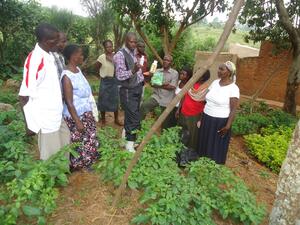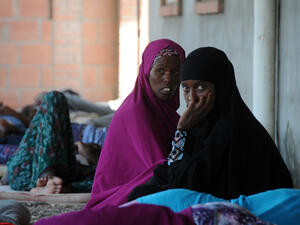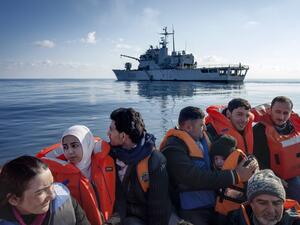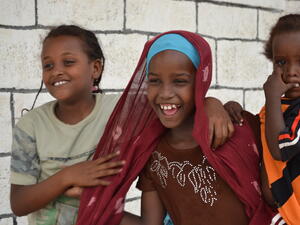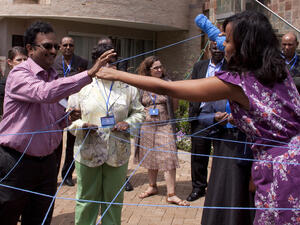Asia-Pacific region takes joint actions to tackle mixed migration
Asia-Pacific region takes joint actions to tackle mixed migration

Indonesia's ambassador to Thailand, Lutfi Rauf, and Australia's Ambassador for People Smuggling Issues Craig Chittick, at the launch of the Bali Process's Regional Support Office in Bangkok.
BANGKOK, Thailand, September 10 (UNHCR) - A regional push is under way to manage irregular, mixed migration in Asia and the Pacific as increasing numbers of migrants, asylum-seekers and refugees embark on dangerous journeys in search of safety and a better life.
On Monday, the Regional Support Office was launched in Bangkok by Australia and Indonesia, the co-chairs of the 46-member Bali Process on People Smuggling, Trafficking in Persons and Related Transnational Crime. This puts into action a regional framework agreed in March 2011 by Bali Process members to support and strengthen practical cooperation on refugee protection and international migration in consultation with the UN refugee agency and the International Organization for Migration.
"Asia hosts a highly-mobile and mixed population, including asylum-seekers and refugees who are increasingly travelling across the region seeking protection and durable solutions," said James Lynch, UNHCR's Bangkok-based regional coordinator for South-East Asia. "By doing so, they put their lives at risk in search of a safer and better life. They also challenge the border management of countries they reach or transit through."
Many are leaving desperate conditions back home in search of safety and a way to help their families left behind. With few other options, they resort to people smuggling networks to reach countries in the region or further afield in Europe and often become victimized by human traffickers on the way. Many board overcrowded, rickety boats that break down or capsize in the rough seas.
In late August, an Australia-bound boat was reported to have sunk off the coast of Indonesia, killing an estimated 100 Afghans and Pakistanis. This was just the latest in a string of boat accidents involving smuggled migrants and presumed asylum-seekers in the region's waters.
Noting that no single country can tackle the problem alone, UNHCR's Lynch said, "Cooperative approaches in the region that build and complement effective national asylum procedures and promote responsibility-sharing, can help asylum-seekers and refugees find viable protection options rather than through dangerous and exploitative boat journeys."
UNHCR believes that enhancing the quality of protection and improving the availability of solutions for refugees in South-East Asia under a harmonized and regional approach will reduce the need for perilous onward movements by sea.
The new Regional Support Office will implement activities under the Bali Process's Regional Cooperation Framework. In practice, the office will serve as a focal point for Bali Process members to share information on refugee protection and international migration; build capacity and share best-practices; and pool common technical resources. It will also provide administrative, logistical, operational and coordination support for joint projects.
Four projects have been proposed under the regional office and are in various stages of development. This includes an initiative to harmonize regional data between countries and international organizations for analysis and dialogue, and a study on information exchange and data analysis on irregular movements by sea. A regional roundtable on irregular maritime movements is planned later this year to coordinate and improve responses among states to maritime incidents. Work is also in progress to develop procedures and standards for the voluntary return of irregular migrants and failed asylum-seekers.
By Vivian Tan in Bangkok, Thailand



